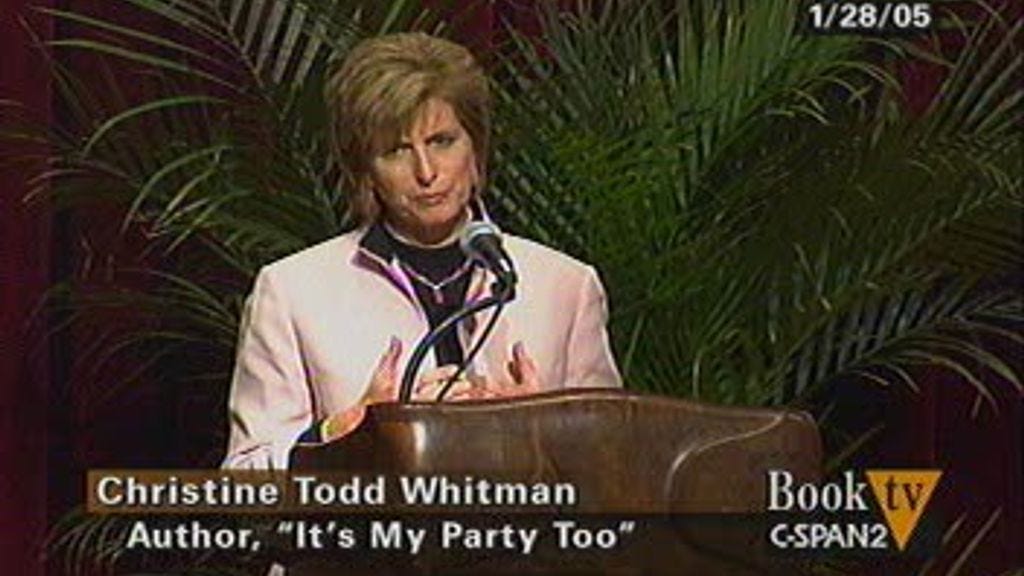Crying on Bush's Parade
Christie Todd Whitman is a blight on the Republican Party.
by Rod D. Martin
January 20, 2005
America today again inaugurated George W. Bush, a man whose very real chance to be ranked among the greatest Presidents lies in his ability to enact a genuine conservative revolution: a sweeping vision of liberty at home and abroad. His success may not be assured, but his progress has been at times breathtaking.
And standing in his path (or at least pouting loudly in the corner) with a book timed to rain on his inaugural parade, is that very embodiment of the old Republican eastern establishment Christie Todd Whitman.
Even the title is a whine. But It's My Party Too is exactly how Whitman feels, the last remaining argument of the leftists who just a few years ago boldly proclaimed that same sentiment without its suffixed qualifier.
Whitman's whimper represents the Republican left's white flag in a war which began with Goldwater. Conservatives are no longer battling for the soul of their party: they are mopping up a defeated remnant, much like U.S. forces in Iraq. Battles remain, but the war is over; and the good guys can only lose by walking away.
Having long been the veritable Anti-Conservative, Whitman sees a party in grave trouble, and only one way to save it: more liberalism. If only Republicans would be pro-abortion, if only we'd pay less attention to the conservatives, if only we'd be more inclusive, if only we'd pitch a “big tent”.
These arguments aren't so much stupid as surreal. Pro-abortion? Even Patty Ireland's polls now show that a large majority of all Americans are pro-life, even a majority of women are now pro-life, and the partial birth abortion ban Whitman vetoed while New Jersey's governor is now considered just basic decency by almost everyone. But Whitman pleads for “accommodation” of a “majority” that doesn't exist.
Pay less attention to the conservatives? Whitman believes the country is basically liberal (she calls it “moderate”, but her policies aren't); she is oblivious -- indeed impervious -- to the fact that virtually all the major gains Republicans have made have been on assertively conservative stands (including her own first run for governor). Ronald Reagan? The “revolution” of 1994? The dramatic gains of 2002 and 2004? To Whitman these are all setting the stage for the party's eventual defeat, an ultimate denouement in which (one can only guess) we were all better off when the only Republicans lived in New Jersey and Connecticut, and happily carried water for LBJ and Tip O'Neill.
Be more inclusive? Bush cut the Democrats' 2000 margin among Hispanics in half. An October 2004 poll showed Bush carrying 18% of blacks (and 36% of black evangelicals), and while this ultimately failed to materialize it showed that Republican outreach efforts were at least provoking flirting, a pretty big step up from open hate. He took 40% of union households and an outright majority of Catholics, against the Catholic class warrior Kerry. If the President were any more inclusive, the Democratic Party might cease to exist.
But nothing is so laughable as the “big tent” line. During the Republican National Convention, I ran into one of Ms. Whitman's closest relatives at Governor Pataki's party at Tavern on the Green. She obviously had no idea who I was, and in the course of discussing the President's plans, this representative of the “inclusive” wing of the party intoned with a hushed voice and deep concern, “I'm worried about all these new people in the party. These Christians scare me.”
“Don't worry, Ms. Whitman,” I said straight-faced. “Our party is a big tent.”
“I don't think it's big enough for those people,” she replied.
For the “big tent” Republicans, the big tent has always been a mansion in Nantucket, no religious Southern riffraff allowed. George W. can come over, because he went to Yale and he comes from a good family, but he sure could have done better than that librarian of a wife, and when he starts all that God-talk it's just not cricket. And anyway, how can any of that be good politics? It certainly upsets Uncle Louis in Marseilles.
Like Margaret Thatcher before us, American conservatives have built a broad national coalition based on enacting Locke and Jefferson's “unalienable rights” of life, liberty and property, and on creating the meritocracy those rights necessarily imply. Our foes all stand for some form of classism, whether the paternalistic aristocracy of old or the evolutionary elitism of the left. Like Thatcher's party, we will rise or fall based upon how vigorously we hold and advance our principles. And like Ronald Reagan, George W. Bush has taken that truth to heart both here at home and around the globe. So must we all.




